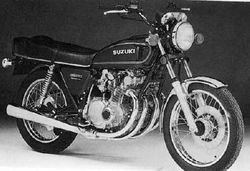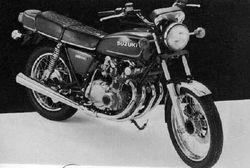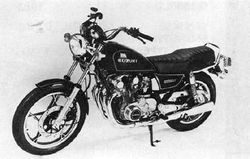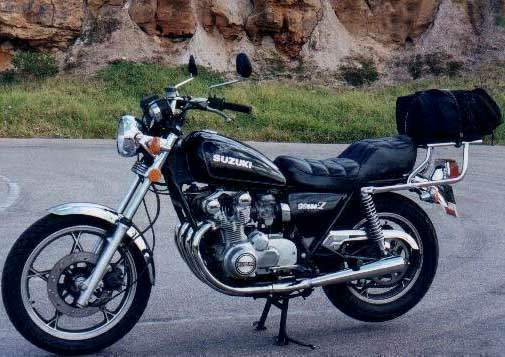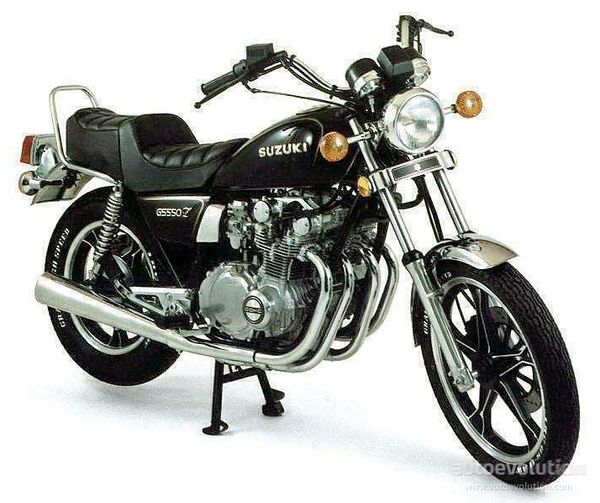Suzuki GS550: history, specs, pictures
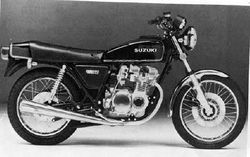 |
|
| Suzuki GS550 | |
| Manufacturer | |
|---|---|
| Production | 1977 - 1981 |
| Class | Standard |
| Engine | in-line four, four-stroke |
| Bore / Stroke | 60.0mm x 50.6mm |
| Compression ratio | 8.6:1 |
| Top Speed | 110 mph (177 km/h) |
| Horsepower | 66.51 HP (49.6 KW) @ 10000RPM |
| Torque | 36.88 ft/lbs (50.0 Nm) @ 8000RPM |
| Fuel System | carburetor |
| Ignition | transistorized |
| Spark Plug | NGK B8ES 77-79 |
| Battery | YUASA YB10L-A2 77-79 |
| Transmission | Gear box: 6-speed Final Drive: chain |
| Final Drive | Chain: 530x110 |
| Front Sprocket | 15T |
| Rear Sprocket | 50T |
| Suspension | Front: telescopic, pneumatic/ coil spring, oil dampened Rear: full- floating suspension system |
| Brakes | Front: single disc Rear: expanding brake (drum brake) |
| Front Tire | 100/90-1654h |
| Rear Tire | 130/90-1667h |
| Wheelbase | 56.89 inches (1445 mm) |
| Length | 82.09 inches (2085 mm) |
| Width | 34.65 inches (880 mm) |
| Height | 45.28 inches (1150 mm) |
| Weight | 410.06 pounds (186.0 Kg) (dry), 222.0 kg (wet) |
| Oil Filter | K&N KN-133 |
| Recommended Oil | Suzuki ECSTAR 10w40 |
| Fuel Capacity | 2.4 Gallon (9.08 Liters) |
| Fuel Consumption | 4.70 liters/100 km (21.3 km/l or 50.05 mpg) |
| Related | Suzuki GS750 |
| Competition | BMW R65 Honda CB650 Honda CX500 Kawasaki KZ650B Suzuki GS550 Yamaha XS650 Yamaha SR500 |
| Manuals | Service Manual |
The Suzuki GS550L was a in-line four, four-stroke Classic motorcycle produced by Suzuki between 1977 and 1981. It could reach a top speed of 110 mph (177 km/h). Max torque was 36.88 ft/lbs (50.0 Nm) @ 8000 RPM. Claimed horsepower was 66.51 HP (49.6 KW) @ 10000 RPM.
Engine[edit | edit source]
The engine was a oil & air cooled in-line four, four-stroke. A 60.0mm bore x 50.6mm stroke result in a displacement of 572.0 cubic centimeters. Fuel was supplied via a double overhead cams/twin cam (dohc).
Drive[edit | edit source]
The bike has a 6-speed transmission. Power was moderated via the wet multi-plate type.
Chassis[edit | edit source]
It came with a 100/90-1654h front tire and a 130/90-1667h rear tire. Stopping was achieved via single disc in the front and a expanding brake (drum brake) in the rear. The front suspension was a telescopic, pneumatic/ coil spring, oil dampened while the rear was equipped with a full- floating suspension system. The GS550L was fitted with a 2.4 Gallon (9.08 Liters) fuel tank. The bike weighed just 410.06 pounds (186.0 Kg). The wheelbase was 56.89 inches (1445 mm) long.
1977 GS550B[edit | edit source]
- FRAME #: GS550-100001
- ENGINE #: GS550-100001
- ENGINE TYPE: 549cc Four-stroke Inline-four
- MODEL CODE: 470
- COLOR: Black, Green
- Spoke wheels
- Rear drum brake
- Black side covers
1978 GS550C[edit | edit source]
- FRAME #: GS550-110407
- ENGINE #: GS550-114441
- ENGINE TYPE: 549cc Four-stroke Inline-four
- MODEL CODE: 470
- COLOR: Midnight Blue, Midnight Burgundy
- Spoke wheels
- Side covers primary color
1979 GS550N[edit | edit source]
- FRAME #: GS550-119862
- ENGINE #: GS550-139272
- ENGINE TYPE: 549cc Four-stroke Inline-four
- MODEL CODE: 470
- COLOR: Green, Maroon
- Spoke wheels
- Side covers primary color
- Folding foot pegs
1981 GS550TX[edit | edit source]
- V.I.N.#: JS1GN71A B 100001
- ENGINE PREFIX#: GS550-
- ENGINE TYPE: 549cc Four-stroke Inline-four
- MODEL CODE: 474
- COLOR: Red, Blue
- Front and rear fenders primary color
- Chrome headlight housing
1979 - 1986 Suzuki GS 550 L[edit | edit source]
The Suzuki GS 550 L is a typical representative of the so-called soft- chopper generation (construction period from 1979 to 1984). Originated from the successful and more sporty 550 E , the 550 L has an extended fork, a chopper steering wheel, a reduced tank and a bench seat.The L models of the GS series enjoyed great popularity, particularly in their "large" variants 750 L, 850 L and 850 GL, 1000 L and 1000 GL as well as 1100 L and 1100 GL, particularly on the US market , Which also explains their long construction period. The end of the GS series represents the futuristic styled GSX 1100 Katana.
In Media[edit | edit source]
- American Ninja 2: The Confrontation
- Year of the Gun
- Class of Nuke 'Em High
- T.J. Hooker
- Dahoam is dahoam
- Skallet
- A Very Peculiar Practice
- Dan cheng lu
- Derrick
- Nightmare Weekend
- Les compères
- Die Rettungsflieger
- Highway to Heaven
References[edit | edit source]
| |||||||||||||||||
